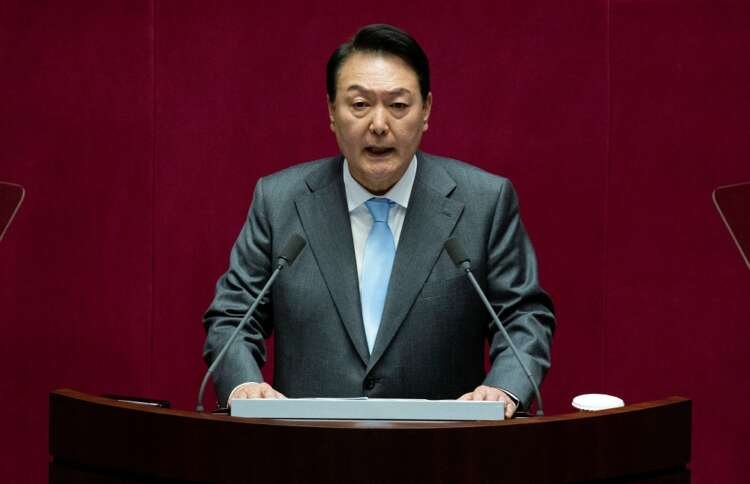Explainer-Why U.S. nuclear deterrence tops S.Korea’s agenda for Biden summit


By Josh Smith
SEOUL (Reuters) – At the top of South Korean President Yoon Suk-yeol’s agenda for his first summit with U.S. President Joe Biden this weekend will be strengthening American “extended deterrence” against North Korea, according to Yoon’s security advisers.
The term means the ability of the U.S. military, particularly its nuclear forces, to deter attacks on U.S. allies.
The issue came to the forefront during the campaign that led to Yoon’s election in March, driven by concerns over North Korea’s increasing missile and nuclear capabilities.
Here’s what Yoon’s team wants from Biden, and why extended deterrence has become a dominant security issue for Seoul:
WHY SOUTH KOREA’S FAITH IS SHAKEN
In 1958, the United States deployed tactical nuclear weapons to the peninsula. It pulled them out in 1991, but has continued to extend its “nuclear umbrella” to South Korea by vowing to use all of America’s capabilities to defend against an attack.
That promise is aimed not only at protecting South Korea, but at making it unattractive for Seoul to pursue its own nuclear weapons to counter the North.
The United States also stations more than 28,500 troops in South Korea, along with tanks, helicopters, anti-missile batteries, and other conventional weapons.
Yoon’s concern comes after faith in the U.S. commitment to defend South Korea was shaken under former U.S. President Donald Trump, who demanded Seoul pay billions more to support U.S. troops. That led to stalled negotiations that were only resolved under Biden.
Trump also repeatedly proposed withdrawing U.S. troops from South Korea, former Secretary of Defense Mark Esper said in a memoir released last week.
The American withdrawal from Afghanistan and debate over its support for Ukraine have also sparked discussions on the need for South Korea to boost its own capabilities, including whether it should pursue its own nuclear programme.
WHAT SOUTH KOREA PROPOSES
During the campaign, Yoon suggested the U.S. could redeploy its tactical nuclear weapons to Korea, but later backtracked.
His team has since asked Biden to permanently deploy U.S. “strategic assets” such as submarines, aircraft carriers, and bombers to the Korean peninsula.
Yoon says he would “normalise” the joint military drills with the United States that were scaled back under outgoing President Moon Jae-in, in a bid to placate Pyongyang and resume stalled talks to rid the peninsula of nuclear weapons.
Yoon has also reactivated an “Extended Deterrence Strategy and Consultation Group” with the United State that hadn’t met for years.
The nuclear umbrella promise is not included in the two allies’ mutual defence treaty. Instead, every year the U.S. defence secretary issues a joint communique with their South Korean counterpart committing to use the “full range of U.S. defence capabilities, including nuclear, conventional, and missile defence capabilities” to extend deterrence to South Korea.
On Tuesday, the conservative Chosun Ilbo newspaper said the war in Ukraine proves that “nuclear weapons can only be deterred by nuclear weapons” and called on Biden and Yoon to discuss “practical” preparations for a North Korean nuclear attack.
However, in a survey to be published in an upcoming Journal of Conflict Resolution, only 27% of South Koreans asked supported a U.S. nuclear response if North Korea used nuclear weapons against the city of Busan. Nearly three quarters of South Koreans surveyed in a separate poll in February favoured the country developing its own nuclear weapons.
WHAT IS THE U.S. POSITION?
Washington has been coy about any plans to permanently deploy strategic assets, and analysts say such a move may be unlikely.
“These need not be permanent to be useful and are best viewed as a rheostat where they can turned up or down, and be brought in when needed,” said Terence Roehrig, a professor of national security at the U.S. Naval War College, noting that deterrence measures must be calibrated not to inflame tensions.
Washington insists its commitment to South Korea’s defence is “iron clad.”
U.S. National Security Adviser Jake Sullivan told a briefing on Wednesday that the United States is prepared to make both “short- and longer-term adjustments to our military posture as necessary to ensure that we are providing both defence and deterrence to our allies in the region and that we’re responding to any North Korean provocation,” without elaborating.
(Reporting by Josh Smith. Editing by Gerry Doyle)
Extended deterrence refers to the U.S. military's capability to deter attacks on its allies, particularly through the use of nuclear forces.
The nuclear umbrella is a security guarantee provided by the U.S., promising to use its nuclear capabilities to protect allies, including South Korea.
The presence of U.S. troops in South Korea serves as a deterrent against North Korean aggression and reassures South Korea of U.S. commitment to its defense.
Tactical nuclear weapons are nuclear arms designed for use on the battlefield in military situations, as opposed to strategic nuclear weapons intended for large-scale destruction.
This group is a forum for the U.S. and South Korea to discuss and coordinate strategies related to extended deterrence and security cooperation.
Explore more articles in the Top Stories category











